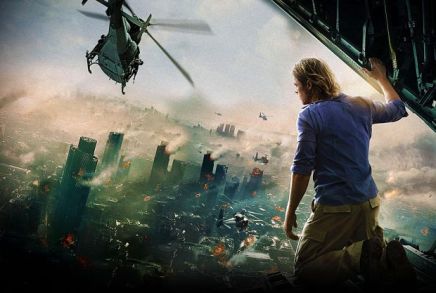World War Z: An Oral History of the Zombie War (Max Brooks) was the zombie book I couldn’t be bothered reading, mostly because the trailer for the film left me a bit underwhelmed. (I have still not seen the film, having had it described to me as ‘Globetrotting Brad Pitt’, so any advice as to whether it is worth my time would be greatly appreciated.) But I picked it up a few weeks ago, looking for something entertaining and gory, and I was positively surprised.

Written as a series of interviews, Brooks weaves a nice story of a zombie plague, pulling in politicians, civilians and military personnel amongst others, to paint a surprisingly believable picture of a plague outbreak. Whilst the zombies themselves are make-believe, I did not have to suspend my disbelief at the portrayal of profiteers, accidental heroes, conspiracy theorists, desperate parents and myopic leaders. Indeed, some of the themes, such as isolationism and inept leadership, can hardly be said to belong solely to the province of fiction. The interviews span a range of responses to a pandemic, and the individual voices were done well enough for me to believe in the characters.
Writing the book as an assembly of individual accounts has one very obvious advantage: it allows for a generous number of viewpoints. When describing a global event, the number of responses and fates will be vast, and Brooks gets to cover more of these than if the story had followed a more traditional trajectory. This way, we can choose from all countries and all walks of life without shoehorning characters into one storyline. We also remove geographical constraints, meaning there will be more to the story than a besieged wal-mart or a stretch of motorway. Whilst it remains quite US-centric, it is refreshing to note that other continents get more than a brief mention.
In many ways, the book reminded me slightly of The Sheep Look Up by John Brunner due to the multi-strand narrative, although Brunner’s book is thematically different (deteriorating environment) and somewhat more dystopian.
Which brings me to my perhaps sole quibble with World War Z: it is less bleak than it could have been, despite being more serious than its predecessor The Zombie Survival Manual. I know it may not be everybody’s cup of tea, but for me, it would have packed a greater punch if it had received a greater infusion of pessimism. That being said, I still enjoyed it immensely and know many readers who prefer a hint of hope with their horror.
Brooks has said that he views the zombie more like a virus than a traditional predator, and that it is this aspect, the lack of any hope for rational discourse or negotiation, that makes the zombie frightening. As I’ve mentioned in a previous post, predation and contagions/infection are the two categories of horror that tend to generate the most successful horror films. Zombies tick both boxes. Yet, they somehow take a back seat in World War Z.
For sure, the zombie in World War Z is the catalyst, the fuel of the story and the indisputable monster of the tale, but the focus remains on the fighting living, not the walking dead. While there is no shortage of gore, I still thought that World War Z was more about the response to the zombie than the zombie itself. The zombie is the monster du jour: an oft-cited metaphor for an uncontrollable world, for pandemics, nuclear war and economic collapse. If we accept the zombie as metaphor, then World War Z becomes a tale of an overwhelmed world, our modern fears illustrated by a vast, unstoppable zombie horde, and it ends with the possible route to regaining control.
Then again, it might just be about monsters.
Either way, it works for me. I read in two thoroughly enjoyable sittings (which would have been one but for the need to attend work). In my view, it’s right up there with Cherie Priest’s Clockwork Century in terms of zombie excellence. If you’ve read it, or read any other zombie books that you can recommend, let me know in the comments!

 (Brad Pitt looking mournfully at the world burning)
(Brad Pitt looking mournfully at the world burning)
